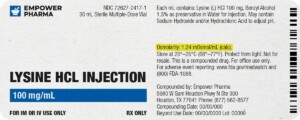There are certain circumstances under which progesterone should not be administered or, if administered, should be done with extreme caution. Some of the absolute or relative contraindications to progesterone administration include:
Hypersensitivity: Progesterone should not be administered to individuals who have a hypersensitivity to progesterone or any of its products.
Hepatic disease: Due to the fact that progesterone is mainly metabolized in the liver, its administration to individuals with significant renal impairment should be avoided as much as possible.
Ectopic pregnancy: Ectopic pregnancy as well as missed or incomplete abortions are absolute contraindications to exogenous progesterone administration.
Breastfeeding: Caution should be exercised when administering progesterone to breastfeeding mothers as detectable amounts have been found in breast milk.
Thromboembolic diseases: Individuals with a current or previous history of thromboembolic disease such as peripheral vascular disease, stroke, or myocardial infarction should not receive progesterone therapy. Individuals with high risk factors for thromboembolic diseases need to be closely monitored if they are given progesterone.
Vaginal bleeding: Progesterone should not be administered to females presenting with vaginal bleeding of an unknown cause.
Diabetes mellitus: Diabetics may receive progesterone therapy with caution as some individuals may experience a decrease in glucose tolerance and a resultant increase in blood sugar levels.
Reproductive cancer: Progesterone therapy is contraindicated in females presenting with breast, cervical, endometrial, ovarian, uterine, or vaginal cancer. Since these cancers are usually hormonally dependent, progesterone administration may worsen these conditions.
Hyperlipidemia: Progesterone therapy has been shown to impair lipid metabolism in some individuals and so should be administered cautiously to individuals with known or suspected cases of hyperlipidemia.
Drug interactions: Care should be taken when administering progesterone with other drugs due to the likelihood of significant drug interactions. Some drugs such as barbiturates can stimulate the production of Cytochrome P450 enzymes in the liver and increase the rate of hepatic clearance of progesterone; this can result in decreased serum levels of progesterone as well as decreased effectiveness.[9]






 Furosemide Tablets
Furosemide Tablets Thyroid Desiccated Porcine Capsules
Thyroid Desiccated Porcine Capsules Oxytocin ODT
Oxytocin ODT Testosterone Troches
Testosterone Troches Rapamycin (Sirolimus) Capsules
Rapamycin (Sirolimus) Capsules NAD+ Cream
NAD+ Cream Minoxidil Capsules
Minoxidil Capsules Bi-Amino Injection
Bi-Amino Injection HCG Injection
HCG Injection DHEA Capsules
DHEA Capsules